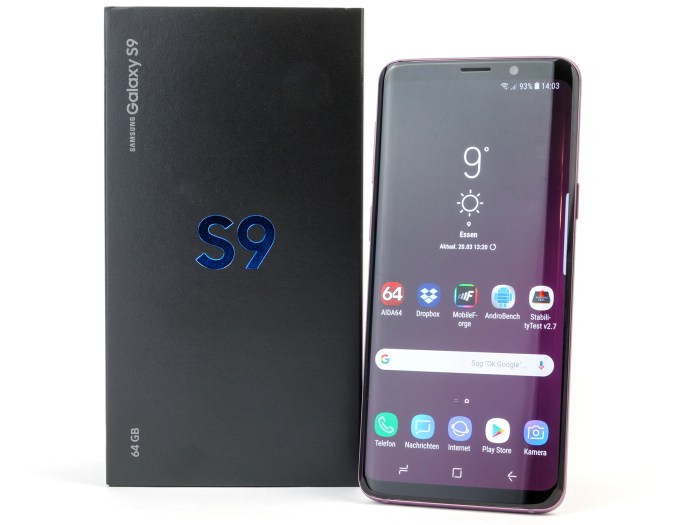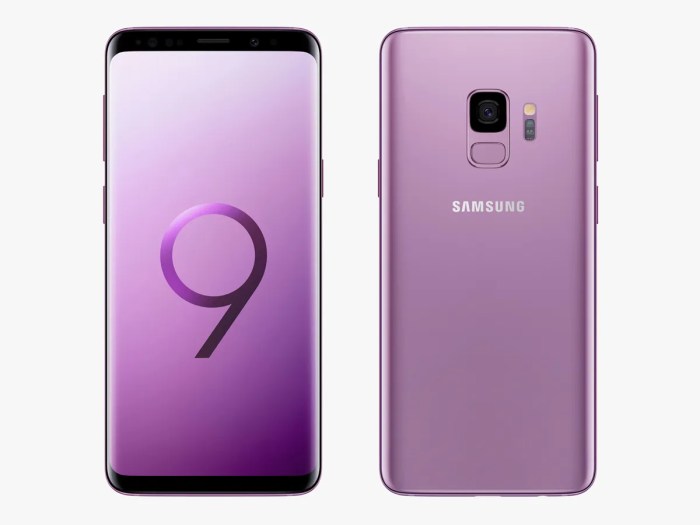Galaxy S9 and S9+ Launch Timeline
The Galaxy S9 and S9+ were highly anticipated smartphones, marking the latest iteration of Samsung’s flagship series. Samsung strategically timed their release to capitalize on the early months of the year, aiming to capture a significant market share before competitors launched their flagship devices.
Official Announcement Dates
Samsung officially unveiled the Galaxy S9 and S9+ at the Mobile World Congress (MWC) in Barcelona, Spain, on February 25, 2018. This annual event is a major hub for the mobile industry, providing Samsung with a global platform to showcase their latest innovations. The announcement generated considerable excitement and media coverage, setting the stage for the official launch.
FCC Certification Process
The FCC certification process is a crucial step for any mobile device before it can be legally sold in the United States. It ensures that the device meets specific standards for radio frequency emissions and interference. This process helps maintain a safe and reliable wireless communication environment for all users.
Steps Involved in FCC Certification
The FCC certification process typically involves several steps:
- Application Submission: The manufacturer submits an application to the FCC, providing detailed information about the device, including its technical specifications and intended use.
- Testing: The device undergoes rigorous testing by an accredited FCC-recognized laboratory to ensure compliance with FCC rules. This testing covers aspects such as radio frequency emissions, power output, and susceptibility to interference.
- Documentation Review: The FCC reviews the test results and supporting documentation submitted by the manufacturer to verify compliance with FCC regulations.
- Grant of Certification: If the device meets all FCC requirements, the FCC grants certification, allowing the manufacturer to legally market and sell the device in the United States.
Timeline for FCC Approval
The timeline for FCC approval can vary depending on factors such as the complexity of the device, the efficiency of the manufacturer in providing required information, and the workload of the FCC.
The typical timeframe for FCC certification can range from several weeks to a few months.
For example, the Galaxy S9 and S9+ were certified by the FCC in February 2018, just a few weeks before their official launch.
Galaxy S9 and S9+ Features and Specifications
The Galaxy S9 and S9+ were Samsung’s flagship smartphones released in 2018, building upon the success of the Galaxy S8 series. They boasted a refined design, enhanced camera capabilities, and powerful performance. These devices were designed to deliver an immersive multimedia experience, impressive photography, and seamless multitasking.
Key Features and Specifications Comparison
The Galaxy S9 and S9+ share many similarities, but there are also key differences in terms of display size, camera capabilities, and battery capacity. Here’s a detailed comparison of their features and specifications:
| Feature | Galaxy S9 | Galaxy S9+ |
|---|---|---|
| Display | 5.8 inches, Super AMOLED, 1440 x 2960 pixels | 6.2 inches, Super AMOLED, 1440 x 2960 pixels |
| Processor | Qualcomm Snapdragon 845 (US/China) or Exynos 9810 (Other regions) | Qualcomm Snapdragon 845 (US/China) or Exynos 9810 (Other regions) |
| RAM | 4 GB | 6 GB |
| Storage | 64 GB, expandable up to 400 GB via microSD | 64 GB, 128 GB, 256 GB, expandable up to 400 GB via microSD |
| Rear Camera | 12 MP, Dual Aperture (f/1.5 and f/2.4) | Dual 12 MP, Dual Aperture (f/1.5 and f/2.4), Telephoto lens with 2x optical zoom |
| Front Camera | 8 MP, f/1.7 | 8 MP, f/1.7 |
| Battery | 3,000 mAh | 3,500 mAh |
| Operating System | Android 8.0 Oreo | Android 8.0 Oreo |
| Other Features | IP68 water and dust resistance, Fingerprint sensor, Face recognition, Iris scanner, AKG-tuned stereo speakers, Wireless charging | IP68 water and dust resistance, Fingerprint sensor, Face recognition, Iris scanner, AKG-tuned stereo speakers, Wireless charging |
Notable Improvements and Innovations
The Galaxy S9 and S9+ introduced several notable improvements and innovations compared to their predecessors:
- Dual Aperture Camera: The S9 series featured a revolutionary dual aperture camera that automatically adjusted between f/1.5 and f/2.4 depending on lighting conditions, allowing for better low-light performance and sharper images in bright light.
- Super Slow-Motion Video: The S9 and S9+ could capture super slow-motion videos at 960 frames per second, enabling users to capture stunning slow-motion shots of fast-paced actions.
- AR Emoji: Samsung introduced AR Emoji, which allowed users to create personalized animated avatars based on their facial features, adding a fun and interactive element to communication.
- Improved Stereo Speakers: The S9 series featured AKG-tuned stereo speakers that delivered a richer and more immersive audio experience.
- Bixby 2.0: Samsung’s AI assistant, Bixby, was enhanced with improved natural language processing capabilities, allowing for more intuitive interactions and personalized recommendations.
Market Reception and Impact: Galaxy S9 And Galaxy S9 Closer Launch Fcc Certification
The Galaxy S9 series, launched in early 2018, was met with a mixed bag of reactions from consumers and tech reviewers. While some lauded its refined design, improved camera capabilities, and performance enhancements, others found it to be a rather iterative update compared to its predecessor, the Galaxy S8.
The initial consumer response was largely positive, with many praising the phone’s camera, particularly its slow-motion video recording capabilities. However, some critics argued that the phone’s design lacked the innovation seen in previous Galaxy S models.
Despite the mixed reception, the Galaxy S9 series performed well in the market. It achieved strong sales figures, particularly in key markets like South Korea, Europe, and the United States. However, it did not quite reach the sales heights of its predecessor, the Galaxy S8.
Here’s a breakdown of the sales figures and market share achieved by the Galaxy S9 series:
* Estimated sales: The Galaxy S9 and S9+ sold an estimated 32 million units globally in 2018. This is a slight decrease compared to the Galaxy S8 and S8+ which sold an estimated 36 million units in 2017.
* Market share: The S9 series maintained a significant market share in the premium smartphone segment, but it faced increased competition from other flagship devices like the iPhone X and the Huawei P20 Pro.
Comparison with Previous Galaxy S Models
The Galaxy S9 series marked a departure from the significant design changes seen in the Galaxy S8 series. While the S9 series offered refined hardware and software improvements, it did not introduce any groundbreaking features.
Here’s a comparison of the S9 series’ success with previous Galaxy S models:
* Galaxy S8 (2017): The Galaxy S8 series was a major success, lauded for its innovative Infinity Display and its advanced camera capabilities. Its sales were higher than the S9 series.
* Galaxy S7 (2016): The Galaxy S7 series was also a commercial success, praised for its water resistance and its excellent camera performance. However, it did not achieve the same sales figures as the S8 series.
Overall, the Galaxy S9 series maintained Samsung’s position as a leading player in the premium smartphone market, but it did not achieve the same level of success as its predecessor, the Galaxy S8 series.
Impact of FCC Certification on Launch
The FCC certification process is a crucial step in the launch of any new smartphone, including the Galaxy S9 series. This process ensures that the device meets the necessary safety and regulatory standards for use in the United States. It significantly influences the overall launch timeline and marketing strategy.
Impact on Launch Timeline
FCC certification can directly impact the launch timeline of a smartphone. The certification process can take several weeks, sometimes even months, depending on the complexity of the device and the efficiency of the testing process.
- Testing and Approval: The device must undergo rigorous testing to ensure compliance with FCC regulations, including radio frequency emissions, electromagnetic interference, and safety standards. This testing process can be time-consuming and require multiple rounds of revisions.
- Documentation and Review: The manufacturer must submit detailed documentation to the FCC, outlining the device’s design, technical specifications, and test results. This documentation requires careful preparation and review, which can add to the overall timeline.
- Potential Delays: Delays can occur due to various factors, such as incomplete documentation, unexpected test failures, or unforeseen technical issues. These delays can push back the launch date and disrupt the overall marketing plan.
Challenges During Certification, Galaxy s9 and galaxy s9 closer launch fcc certification
The FCC certification process can present several challenges for manufacturers.
- Meeting Strict Standards: The FCC has stringent regulations regarding radio frequency emissions, electromagnetic interference, and safety standards. Meeting these standards can be a complex and demanding task, requiring meticulous design and testing.
- Time Constraints: The FCC has a specific timeline for reviewing and approving applications. Manufacturers must adhere to these deadlines to avoid delays. This can create pressure to expedite the certification process, potentially leading to errors or oversights.
- Cost Considerations: The FCC certification process involves significant costs, including testing fees, documentation preparation, and potential revisions. These costs must be factored into the overall budget and can impact the launch strategy.
Impact on Marketing and Launch Strategy
FCC certification has a significant impact on the marketing and launch strategy for a smartphone.
- Launch Date Announcement: Manufacturers often announce the launch date of a new device based on the expected FCC certification timeline. Any delays in the certification process can disrupt this plan and require adjustments to the marketing campaign.
- Pre-Order Availability: Pre-orders are a common strategy for generating excitement and gauging demand for a new device. The FCC certification timeline plays a crucial role in determining when pre-orders can be opened, impacting the overall marketing strategy.
- Media Coverage: Media outlets often rely on FCC filings to get early insights into upcoming devices. Delays in certification can affect the timing and content of media coverage, potentially impacting the overall marketing momentum.
Galaxy s9 and galaxy s9 closer launch fcc certification – The FCC certification of the Galaxy S9 and S9+ marks a significant milestone, bringing us closer to the official launch date. With the official announcement just around the corner, anticipation is building for the release of these powerful and innovative smartphones. Stay tuned for more updates and prepare to witness the future of mobile technology unfold.
The Galaxy S9 and S9+ are almost here, with FCC certification hinting at an imminent launch. It’s like the anticipation for a big video game release, where the hype builds and builds. Remember when everyone thought a PC version of GTA 5 was a pipe dream? Well, rockstar gta 5 for pc was always in the cards and it was a huge hit.
Similarly, the Galaxy S9 launch is going to be a big deal, and we can’t wait to see what Samsung has in store.
 Standi Techno News
Standi Techno News

